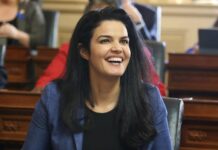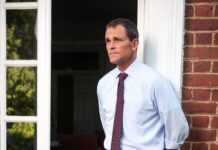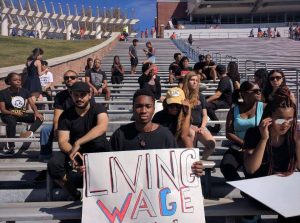
Colin Kaepernick’s decision to kneel during the national anthem in protest of the social injustices in America has spread to the University of Virginia. Students emulated the professional athlete’s act at the October 7th football game at Scott Stadium.
In 2015, Kaepernick told the NFL media: “I am not going to stand up to show pride in a flag for a country that oppresses black people and people of color.” While the football player has recently reignited the conversation of politics in sports, he is not the first person to make a political statement in an athletic arena.
PROTEST AT UVa:
Dr. Sabrina Pendergrass is an Assistant Professor of Sociology and African American/African Studies at UVa. Her research focuses on race, inequality, culture, and African American population migration from the North to South.
When WUVA News spoke to Dr. Pendergrass about the history of African Americans bringing political and social issues into sports, she explained that “even outside of the realm of entertainment and sports, African Americans have a much more critical understanding of American Patriotism.”
“How do we realize equality for everyone? In general, the history, the scholarship of African Americans have been focused on pushing the nation to live up to these ideals that all men were created equal,” she continued.
Critics will often say that sports arenas are not the rightful locations for political stances. This is also a response Black Student Alliance member, Kajsa Fosky told WUVA she received at Scott Stadium.
Dr. Pendergrass responded to why opposition to the act of protest often plays out this way.
“The first question would be, when is the time? There is something about a time that makes people uncomfortable,” she said.
“I also think it is related to a history of looking for respectable behavior from black people… we know that even when people have protested in a respectable way, that did not mean that systemic changes occur. Folks get to a point where they say ‘well, we’ve done it that way so now we’re going to do it this way.'”
BACKLASH AGAINST ATHLETES:
Colin Kaepernick and others who decide to carry out similar protests are often met with brutal backlash.
Toni Smith Thompson was captain of the women’s basketball team of Manhattansville College in 2003. She went viral and faced severe criticism for deciding to turn her back to the flag leading up to the United States’ decision to go to war with Iraq.
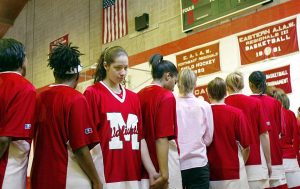
“Sports historically have been a vehicle for nations to display their patriotism and power,” Thompson explained to WUVA.
“In American culture sports is a foundational place where people assert their dominance, winning, victory, and power…we are now marching back against the government being able to use sports for their own gain to shape narratives and messages in ways that don’t support us all, without our consent.”
Others however, believe that protests during the anthem disrespect the flag and the sacrifices made by veterans.
Thompson pointed out that these displays of patriotism carried out by NFL teams are not always as genuine and heartfelt as the public wishes to believe. NJ.com obtained government records in 2015 that revealed that patriotic ceremonies in big league sports games are more like advertisements rather than symbolic gesture of appreciation. The reports also found that these ceremonies are paid for by the Department of Defense using taxpayer money.
At times, getting major teams to salute the military came at a high cost. Between 2011-2014, it became clear that the Department of Defense paid no less than $6 million to various teams in the NFL. Teams received pay for saluting and showing videos of service members. Spectators may have considered such actions displays of patriotism and gratitude.
A HISTORICAL PERSPECTIVE:
Some who were criticized and ostracized in the past have eventually gone on to be viewed as heroes in the future. Martin Luther King is perceived a lot more positively today than he was during his life, where he was targeted as a wanted criminal.
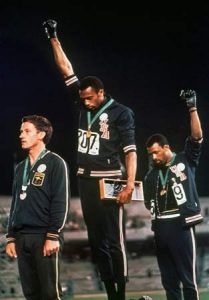
“Because the systematic issues [racial inequalities] are still there, I think we see similarities in how people are trying to respond,” Pendergrass explained.
“Right now, Colin Kaepernick is receiving this hostility and 20 years from now people may look back and think of him as a national hero,” she added.
Toni Smith Thompson recalls the backlash she received for her protest.
“I was not a notable figure so I had no reason to believe a protest like that would matter so much… There were chants against me saying I was not an American, they called me every slur you can call a woman, and told me to leave the country,” Thompson said.
POLITICS AND WHAT HOOS THINK:
Kaepernick’s protest started in 2015 but has recently gained momentum. Many people have made up their minds on how they feel about it.
Even President Trump chimed in on Twitter saying: “The NFL has all sorts of rules and regulations. The only way out for them is to set a rule that you can’t kneel during our National Anthem.”
The consequences of these actions have not seemed to change much over time. Tommie Smith and John Carlos were ostracized for their protests at the 1968 Olympics. In addition to the harsh criticism Colin Kaepernick faces today, he has not been signed by a team since his protest and is no longer employed by the NFL. Toni Smith Thompson retired from basketball and works as an organizer at the New York Civil Liberty Union where she continues her fight for social justice.
UVa student Nico Barton shared his opinion on protests in sports.
“I personally wouldn’t [take a knee], but obviously, you have the right to. Nothing should get in the way of someone’s right to say what they want to say as long as it isn’t hurting anybody else,” Barton stated.
Fellow Hoo Briana Jacobs said she understands why athletes have taken their protests to the field.
“Personally, I think political protests in sport arenas are a good platform. A lot of professional athletes are nationally televised and if they want to make a statement, it is a good way to do it.”
WUVA News reached out to UVa Athletics employees for an interview on the topic of politics in sports but they declined our request.







